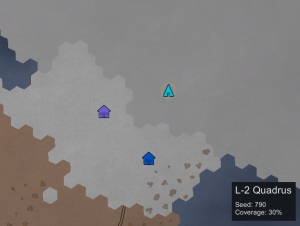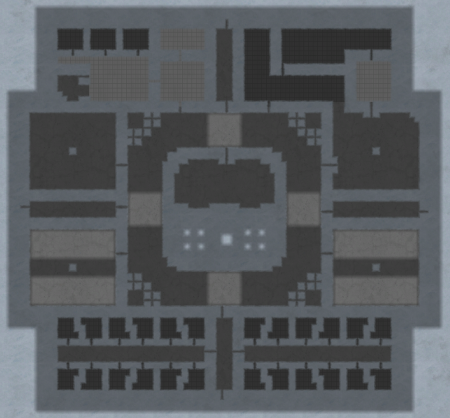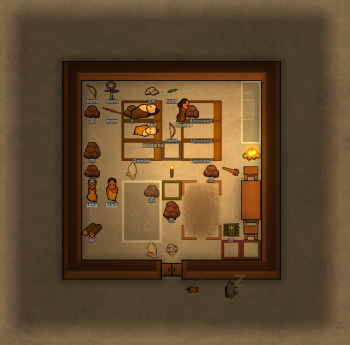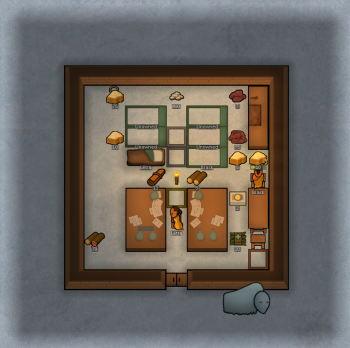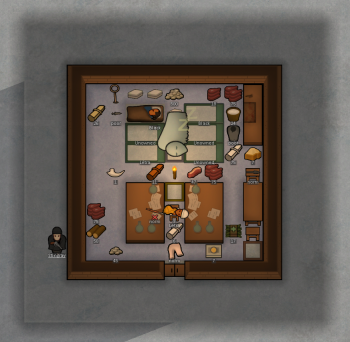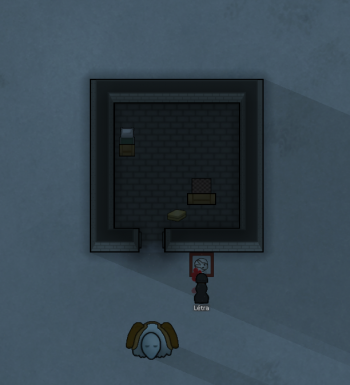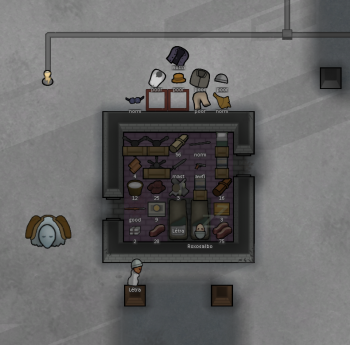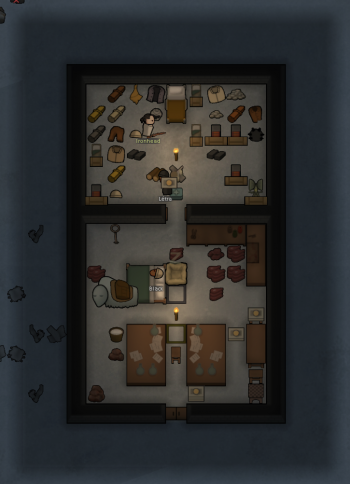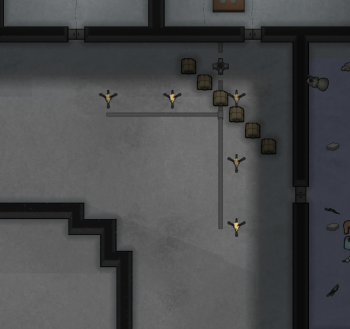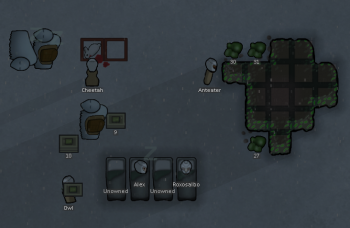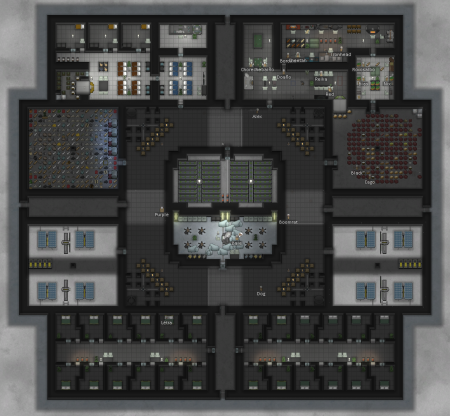Sea Ice Guide
| This article is suggested to be rewritten. Reason: Verification and/or updates to current version and DLC options needed. You can help the RimWorld Wiki by improving it. |
This guide is currently being updated to Royalty and Ideology DLCs.
Please note: This guide was made with version 1.0.2096 on Cassandra on Merciless difficulty - equivalent to Losing is Fun difficulty as of 1.1.2647. Gameplay changes after point may not be represented.
This guide details how to survive in the most hostile environment in RimWorld - sea ice. We focus on the Lost Tribe start because it's the hardest to thrive in in barren environments, since you have more people to feed and less technology to help you.
The tribal start in sea ice is the ultimate survival challenge in RimWorld and very close to being impossible, therefore there is not much room for different strategies here You have to stick closely to the guide.
Introduction[edit]
The Sea Ice biome is one of the coldest biomes in the game. There is almost no animal life and no plants. In fact, you shouldn't expect to find anything more than three snowhares in your start. You also shouldn't expect to see more than one new snowhare every week.
In addition to that, there is no kind of soil available and moisture pumps will only generate more ice. It is literally impossible to grow anything in the ground. You will struggle a lot until you get a heater and a hydroponics basin, then you can plant something indoors.
Even worse is that there are no ruins, geothermal vents or minerals to mine. Also, deep drills don't provide rock chunks at all and won't even provide other resources without a ground penetrating scanner. There is literally nothing here to even build a base with. You'll have to rely on trading, quests and random events to get any material to build a base.
Even on the warmest sea ice tiles, it's still really cold. The average varies from -20 °C (-4 °F) to -30 °C (-22 °F) and they never have growing periods due to the temperature. You still need to eventually make a freezer though, because the summer temperature can be hot enough to spoil your food. Expect to have problems with hypothermia during fall, winter, spring and during cold snaps in summers.
They are particularly bad for travel by caravan. They do not have roads and are always placed in the poles of the world, so they have a big penalty to caravan speed due to winter, which is most of if not the whole year. But caravans are more important here than in any other biome, so you'll have to do it anyway whenever you can, because you don't have other reliable options to get the resources your colony needs.
Landing site[edit]
In all maps you should choose your landing site carefully to increase the resources available. Landing in the wrong spot not only makes your start harder, but also makes your mid-late game frustrating, as it severely limits your use of the whole caravan and quest system. Sea ice is always in bad locations, but there is one thing that makes some areas better:
- Near a friendly faction base (faster trading)
Sea ice tiles do not have roads or rivers, neither does ice sheet which is always next to you. All you can do is be near to a friendly faction base. Without trading it is impossible to survive.
To make things better you should settle close to two faction bases. You will expand much faster in the mid-late game with help of two faction bases instead of just one.
Starting colonists[edit]
There are a few things to consider while selecting your colonists for sea ice:
- Sea ice is so harsh that you will have to resort to cannibalism, slavery and organ harvesting, so you want to have a crew that can endure that.
- You can't feed five people; neither can you put them to sleep in cryptosleep -- and people are the only thing you have that is worth something. So, since you can only feed about two people, you have to sell the other three. You won't use them in the beginning, but you might still meet them later on quests.
Needless to say, with so few people and such a stressful life, you'd better pick people resistant to mental breaks.
Base planning[edit]
It's always better to plan your whole base right from the beginning.
The whole map is empty, save for a few water pools. The good news is that you can place your base right in the middle and make it very symmetrical.
Regardless, remember that it will take a really long time to get the materials to make your base, so you'll probably live in just one of your planned rooms for years.
First agenda[edit]
- Make your starter base with wood. Give people a place to sleep, eat and play.
- Whenever you refuel campfires, either for cooking or heating up, make sure to disable refueling so they don't refuel it unnecessarily. Forbidding any wood that is not currently being used will help prevent any mistakes.
- Hunt those snowhares before they leave the map.
- Arrest your three merchandise colonists.
- Sell your merchandise colonists and your starting animals.
- Buy your survival items with the silver you got from selling your people and animals.
- Make lightleather bedrolls.
- Make your research bench and start researching complex clothing.
Notes[edit]
Hunt the bunnies, make a room to arrest people, then go sell them.
Go and visit your nearby friendly base to trade your merchandise colonists, your animals and some useless weapons. You should get somewhere between 1500 and 2000 silver for three colonists and three animals in addition to your starting 200 silver.
Now you have to buy some food, clothes and materials. Since you can't carry all the materials you need, you need to come back to trade many times. Food should be the cheapest option available. Nutrient paste meals, insect meat, human meat and vegetables are the best options. Meat is more expensive but it's better to cook that than buy fancy meals.
Clothes are just a little insulation to save you in the first season, the cheapest tuque is enough. After that, you need to either make your own clothes or strip clothes from raiders, even if they are tainted.
You need at least 25 steel to make your research bench and some wood to use for cooking. Try to build two research benches if you can, otherwise your other colonist will often be idle. Later, you will need more materials to actually build a base. First you want wood and steel because they are lighter, but later you want stone blocks, which are cheaper and do not catch fire.
BONUS: Buy a Muffalo[edit]
You need to keep one colonist at base researching, so trading will be really inefficient with just one colonist to carry stuff. There is one solution: a Muffalo.
It will more than triple your carry capacity and eventually give you wool. Unfortunately, there is no guarantee that a faction base will have a Muffalo for sale, unless you keep reloading before you trade until they have it. If you don't want to do this, you can keep three colonists with you and use two colonists for trading instead. But remember, a colonist eats more and carry less than a Muffalo, so it's going to slow down your progress.
Second agenda[edit]
- Keep trading to get food whenever needed.
- Keep trading to get materials to make a base.
- Harvest and sell the organs of anyone you capture alive.
- Butcher and eat the meat of any dead bodies you get.
- Make human leather bedrolls.
- Make and sell human leather tribalwears.
- Wear their tainted parkas and tuques if you've got nothing better.
Notes[edit]
The first raid should arrive by the end of the first week. Try to have a colonist with a gun or both together in your base when that happens, because you do not have any defenses yet.
Now the fun starts. You will harvest the organs, eat the meat and wear the skin of your enemies. If anyone tries to join your colony, you will sell or harvest them too because you can't currently afford more people. People who you will harvest include:
- Any raider that shows up.
- Any wanderer that decides to join.
- Any survivor who arrive in a escape pod.
- Any refugee who asks for help. Also the raiders following them.
By butchering your enemies you will get food and leather, which you can make into tribalwears and sell, but that won't be enough. Everything you get is through trading, so you should also harvest and sell the organs of anyone you capture alive before eating them. It's worth buying medicine just for that. You don't need to do this every time, but it gets you a lot of money and will greatly speed up your colony building.
BONUS: Summon Man In Black[edit]
Getting Man In Black to show up when you have so few people is really easy. Just set their 'Food Restriction' to 'Nothing' and wait until people collapse. Then use him to bring people back up.
Man In Black comes with good gear. You should strip his gear and sell him into slavery, or harvest him.
Third agenda[edit]
- Buy guns.
- Do all the quests you can, loot and butcher anything and anyone you see.
- Buy cloth from your neighbors.
- Once you've researched complex clothing, make parkas and tuques with cloth.
- Make and sell human leather dusters.
Notes[edit]
Make sure to buy some decent guns since your researcher colonist will likely have to defend themself alone while your other colonist is outside trading. Fortunately, you'll be so poor that even on the hardest difficulty, it's likely you'll only face raids of one single melee enemy for the whole first year.
Once your colonists have parkas and tuques you should take every opportunity available to go to another map. Your trading colonist should always be either trading or doing quests. Do not forget to take a bedroll with them on quests. Quests that matter now include:
You'll have more things to care about here than you normally would. It's important that you butcher every animal you find and every raider you kill on the quest locations. You might find your previous colonists (which you sold before) on those quests. If your human leather clothes and organs business is doing well, you can afford to bring one more person to your colony. Don't forget that you'll have to buy more meals for each person you save. Anyone you don't like can be sold or harvested once you return home.
Your research is really slow, since you only have one person at home taking care of everything and doing research at the same time. So another thing to focus on is furniture that you can carry home, since it will take a while for you to be able to make them. Heaters, batteries and turrets are also great to bring home. You don't have electricity yet, but once you do, you're going to have lots of things to plug in.
Make sure you have good clothes before winter starts. It's also about the right time to get rid of tainted clothes and make your own. Go buy cloth and make some decent parkas and tuques with it. Most importantly, make and sell lots of human leather dusters because they are worth a lot.
Fourth agenda[edit]
- Research complex furniture.
- Make beds.
- Replace your walls with stone.
- Replace the cloth parkas with better insulating parkas.
Notes[edit]
Winter makes caravans even worse than they already are. Despite that, you can never stop trading -- nor can you stop doing quests.
Time to make improvements. If you have at least two rooms and all the necessary workbenches, you can start replacing your walls with stone so raiders won't try to set them on fire. Replace your bedrolls with beds. If you want, you can also make some comfortable human leather armchairs and human leather animal beds.
Try to replace your cloth(cold insulation 18) for bearskin(cold insulation 20), bluefur(cold insulation 20), foxfur(cold insulation 20), devilstrand(cold insulation 20), alpaca wool(cold insulation 22), synthread(cold insulation 22), wolfskin(cold insulation 24), muffalo wool(cold insulation 24), megasloth wool(cold insulation 26), hyperweave(cold insulation 26), chinchilla fur(cold insulation 30), heavy fur(cold insulation 30) or thrumbofur(cold insulation 34).
Your best bet is thrumbofur parkas with muffalo wool tuques. Thrumbo is the only animal guaranteed to show up in sea ice and you should already have a Muffalo with you for wool.
Fifth agenda[edit]
- Research electricity.
- Set up defenses.
- Set up power.
- Make a kitchen.
Notes[edit]
Your second year will be just as hard as the first one. You still have to harvest and eat your enemies while trading human leather dusters and organs for materials for your base.
You probably already learned to live from trading and quests by now, and may add another colonist. You should not expect to finish electricity before the end of the second year. So unfortunately, your food will spoil in the second summer. You can try to keep the stocks low to avoid loses or turn your food into pemmican.
Now however, you've got more people so you've got to set up some kind of defense, because raiders will be more numerous. This place is wide open, so you want to make an enclosed environment where you can shoot raiders from behind sandbags without getting outranged. In other words, you want a killbox. Once you finish electricity, you can finally use those turrets that you got from enemy outposts. If you could not bring any batterys home from quests, you'll have to research them now.
When you are setting up power, keep in mind that solar generators will not work at all during winter in sea ice.
With electricity, you can finally make a electric stove so you may stop buying wood.
Sixth agenda[edit]
- Research air conditioning.
- Make a freezer.
- Research nutrient paste.
- Make a nutrient paste dispenser.
- Research microelectronics.
- Make a comms console.
Notes[edit]
Your third year will come with lots of improvements and you can finally start feeling like you are playing on a normal map.
Your first priority after electricity is air conditioning, so you stop losing all your food in summer. Once you're done researching it, make a freezer. That will even allow you to accept more people in your colony since your food now lasts forever.
Then you want to make the almighty nutrient paste dispenser. It frees your cooker to do other stuff, completely prevents food poisoning and reduces your food consumption by 40%. You may even buy another Muffalo now to speed up trading.
Then, to increase your trading opportunities, you want a comms console. Any bulks good trade ship that shows up will be a blessing to your colony development.
BONUS: Buy Joywires[edit]
You might have noticed by now that your worst enemy isn't the hunger or the raiders, but the mood penalties that come with harvesting and eating people. Still, you can't stop it, since without that you'd lose your main source of food and your two main sources of silver (human leather dusters and organs).
Now that you have a little extra silver, you can buy a solution: the Joywire. Overall, in such a stressful colony this implant is well worth it. The drawbacks of the Joywire can later be offset with bionics.
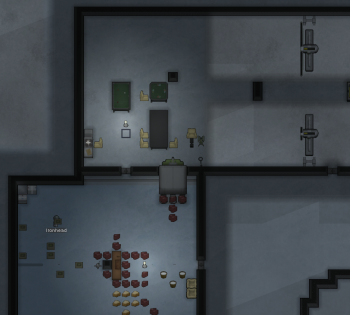
Seventh agenda[edit]
- Research hydroponics.
- Make a greenhouse.
- Research biofuel refining.
- Research gun turrets.
Notes[edit]
You are on your fourth year and still have yet to plant something, so you start wondering if you even need to plant anything at all.
A greenhouse will require a lot of power, which means you will have to defend a larger area to put extra wind turbines in. You will also want to add a lot more batteries to store power at night so it may be used during the day. Make sure that your greenhouse is as small as possible to take less power, and is covered by double walls to increase insulation.
The greenhouse will allow you to stop buying food to survive and stop the cannibalism. Of course, it will also allow you to have more colonists. But first, you should plant some healroot so you can harvest organs without using good medicine. Also plant smokeleaf and psychoid plant, so you can make smokeleaf joints and psychite tea to reduce the overall stress in your colony. Then you may plant some food.
Without the cannibalism, you may turn your human meat into chemfuel. Then you can use chemfuel powered generators during winter and solar generators during other seasons.
You are getting wealthy and the raiders know it. Eventually, the turrets you get from quests will not be enough, so you need to research them so that you can make more of them by yourself.
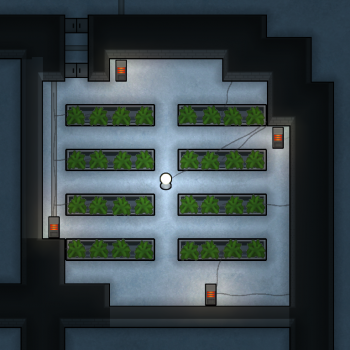
Eighth agenda[edit]
- Research and build a long-range mineral scanner.
Notes[edit]
There is one last thing worth focusing on in sea ice. The long-range mineral scanner.
The scanner works normally on sea ice. If you set a colonist to work on it full-time, it can pick up locations of minerals faster than you can retrieve them. Which means you can endlessly make quests for minerals to greatly increase the amount of materials available for you to build your base.
However, you should keep in mind that minerals are heavy, so you need lots of Muffalos to carry it. Like a whole 8 Muffalos and 6 colonists to mine Uranium. Which is why it's better to make it after your greenhouse, because then you can support all the Muffalos you need.
Tenth year[edit]
With all that empty space, make a huge symmetrical base.
Other scenarios specific[edit]
- Build 1 wind turbine and one heater inside small room when your colonists will spend the vast majority of time.
- Steel and components will be worth their weight in gold. Can be increased by ship chunks, meteors and traders.
- Obtain 1 advanced component at any cost.
- Research batteries and build 1-2 near the house.
- Then turn to hydroponic research. Until its done, build 3-4 batteries, 2-3 wind turbines, sun lamp and 1.5 farms per pawn. You have a source of food.
- Create advanced research table and research the deep drill and Ground-penetrating scanner. Build them, and you now have unlimited steel to build a base.
- From this moment, if you already have warm clothes, you can easily survive.
Naked Brutality - hopeless.
